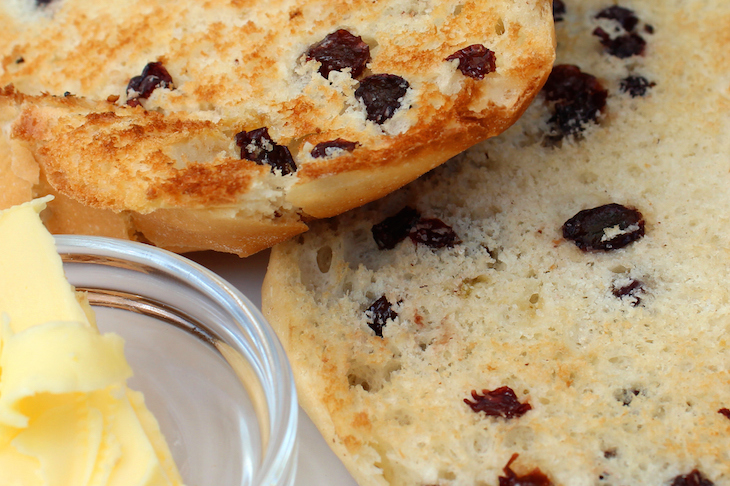The Sunday Telegraph has been running a correspondence on the origin and nature of teacakes. One reader averred that in the north no smear of jam is permitted to spoil one. On this, the earliest quotations found by the Oxford English Dictionary do not help, indeed — heavens! — they almost suggest an American origin. The first (1832) is in The American Frugal Housewife, by Lydia M. Child. Her recipe is: ‘Three cups of sugar, three eggs, one cup of butter, one cup of milk, a spoonful of dissolved pearlash, and four cups of flour, well beat up.’
Pearlash (pearl-ash, rather than pear-lash) is potassium carbonate, used as a raising agent, though I wouldn’t. Eggs would also make those teacakes quite different from today’s items.
The next OED quotation is from 1843, in Dickens’s Martin Chuzzlewit: ‘Tea and coffee arrived (with sweet preserves, and cunning tea-cakes in its train).’ But the context is Martin’s tour of America.
One Sunday Telegraph reader quotes Dorothy Hartley (Food in England, 1954) saying that a teacake is the ‘descendant of the manchet (hand) bread laid for each person on medieval tables’. Manchet did mean fine bread in the Middle Ages, but manche in French is ‘sleeve’, not ‘hand’. One theory is flour for manchets was sieved through a straining sleeve.
However, a 15th-century cookery book gives a synonym for manchet of pandemain (which Chaucer uses). That looks like ‘hand’. Yet etymologists tell us that pandemain and its synonym demeine come from panis dominicus, ‘the lord’s bread’. So ‘hand’ isn’t in it, even when manchet is curtailed to maine.
Heralds used manchet for a round-loaf shape, either as in nature (manchet proper), or of gold (manchet or), in which case I couldn’t tell it from a roundel or or bezant.
A special use of manchet was to translate words of St Ignatius of Antioch, on his way to be thrown to the lions. ‘I am to be grinded with the teeth of beastes, that I may be founde pure breade, or fine manchet,’ says the rendering by Meredith Hanmer (1574). Manchet here for the Latin mundus panis was copied by Thomas Fuller and less famous writers for two centuries. The lions didn’t demand jam on it. –
Got something to add? Join the discussion and comment below.
Get 10 issues for just $10
Subscribe to The Spectator Australia today for the next 10 magazine issues, plus full online access, for just $10.
You might disagree with half of it, but you’ll enjoy reading all of it. Try your first month for free, then just $2 a week for the remainder of your first year.















Comments
Don't miss out
Join the conversation with other Spectator Australia readers. Subscribe to leave a comment.
SUBSCRIBEAlready a subscriber? Log in